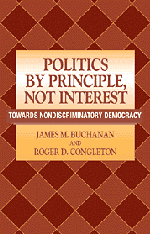1 - Generality, law, and politics
Published online by Cambridge University Press: 27 March 2010
Summary
Social sciences analyze the relationships between and among persons, groups, and organizations. This inclusive definition incorporates economic, legal, political, and social interactions. In ordinary market exchange, the individual is simultaneously a demander and supplier, a buyer and seller. In social arrangements, the person may be both a care giver and a care receiver, a lover and a beloved, a gift taker and gift giver, a friend and a befriended. By comparison, in law and in politics such reciprocity need not be present. The individual is subject to the law, but he may or may not be a member-participant of the organized entity that makes-changes or enforces the law. In fiscal politics, the individual is subject to the coerced exaction of taxation and to the possible nonexclusive benefits of governmental programs, but he may or may not be a member-voter-participant in the collectivity that makes basic political choices. In either of these cases, in which the individual is subject to but not a participant in the process, reaction rather than explicit reciprocation describes behavior.
Our concern in this book is exclusively with those structures of social order that qualify as “democratic” in some ultimate participatory sense. We shall not analyze the relationships between individuals and an externally existing maker-enforcer of law and political authority. Critics may suggest that the authority of convention and tradition, especially in law, places any subject-person in a position that is not different, in kind, from that which is present under externally imposed rules. But the individual, as a participant in a continuing process, also plays some part in constructing the order itself.
- Type
- Chapter
- Information
- Politics by Principle, Not InterestTowards Nondiscriminatory Democracy, pp. 3 - 12Publisher: Cambridge University PressPrint publication year: 1998



